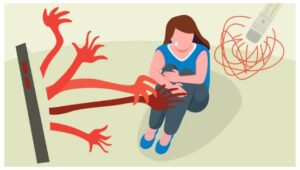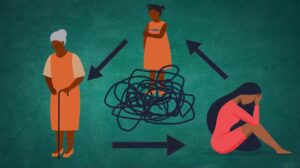Depression is a mood disorder that causes a persistent feeling of sadness and loss of interest in an individual. Depression is also known as major depressive disorder or clinical depression, this mood disorder constantly affects how you feel, think and behave and can often lead to a variety of emotional and physical problems. This can negatively affect one’s lifestyle in critical ways. One may have trouble doing normal day-to-day activities, lose interest in any pleasurable activities and sometimes instill a strong feeling that life isn’t worth living.
Depression is a fairly common form of mental illness and the National Mental Health Survey conducted in 2015-16 revealed that nearly 15% of Indian adults need medical care for one or more mental health issues and one in 20 Indians suffers from depression.
Every individual experiences depression in different ways. There may be a loss of energy, a drastic change in appetite, sleeping a lot or very little, anxiety, indecisiveness, feelings of worthlessness or severe hopelessness, and thoughts of self-harm. It may interfere with your daily work, consuming major chunks of your time and lowering productivity. It can also affect your relationships with different people and some chronic health conditions like arthritis, obesity, cancer, etc.
It’s very important to realize that feeling down or a bout of blues from time to time is a normal part of life. Getting sad and upset is normal and distressing events happen to everyone. But, if you’re feeling down or hopeless constantly for long hours, you could be dealing with depression.
Depression is a serious medical condition that cannot be managed by an individual on his own and can get worse without proper treatment. People who seek treatment often see improvements and are able to reduce the symptoms and be more in control of their emotions in just a few weeks.
Symptoms of Depression:
Depression is more than just bouts of blues and constant state hopelessness. There are several signs of depression that can be observed in order to decide whether or not you’re suffering from depression. Some symptoms affect your mood while others may affect your body. Symptoms can be ongoing, or they come and go like episodes. The symptoms of depression are experienced differently from individual to individual.
- Hopeless outlook or unshakable feelings emptiness or hopelessness. One constantly questions as to ‘what’s the point?’ of any activity or life.
- Feeling down or sad and tearful almost constantly regardless of the situation.
- Unexplainable rage, irritability, or frustration, over the smallest of matters and at times without any cause.
- Loss of interest in activities that used to provide any sort of pleasure to the individual such as sex, hobbies, or sports.
- Disturbed sleep patterns include either insomnia (lack of sleep) or excessive sleep. One also feels tired constantly and experiences a lack of energy, even small tasks take extra effort.
- Gain or loss of weight due to loss of control over the appetite. There’s either a shockingly reduced appetite leading to weight loss or fundamentally increased cravings for food resulting in weight gain
- Feeling of restlessness and agitation. There’s a persistent feeling of panic or anxiety that can sometimes result in trouble thinking, concentrating, making decisions, and remembering things.
- Feeling lethargic or slowed responses. Slowed thinking, speaking, or body movements
- Feelings of worthlessness or guilt, one keep fixating on their past failures or self-blame for the smallest of mistakes.
- Thoughts of self-harm or suicide. Recurrent attempts on self-harm, thoughts of suicide, and suicide attempts.
- Physical pain triggered by depression. Unexplained physical problems, such as back pain or headaches are sometimes born out of depression.
For most people who are suffering from depression, the symptoms usually are severe enough to cause noticeable problems in their personal lifestyle and social life, such as work, school, or relationships with others. But sometimes with some people, the symptoms aren’t prominent enough. They may feel generally miserable or unhappy without any apparent cause or really knowing why.
Causes of Depression:
Psychologists aren’t fully sure as to what is the actual cause of depression. As every individual is different, psychologists have theorized a number of possible causes. Some of the common causes are:
- Genetics. One is more prone to or at a higher risk for developing depression if there is a family history of depression or any other kind of mood disorder.
- Early childhood trauma, some events of your childhood shape your understanding of the world and affect the way your body reacts to fear and stressful situations. They can also become the trigger points for your episodes.
- Brain structure, there’s a greater risk for depression in an individual if the frontal lobe of his/her brain is less active or slow. However, psychologists are unable to determine if this happens before or after the onset of depressive symptoms.
- Medical conditions of the individual. Certain conditions, such as chronic illness, insomnia, chronic pain, or attention-deficit hyperactivity disorder (ADHD), may make one more susceptible to depression.
- Alcohol and Drug abuse. An individual with a history of drug or alcohol misuse is at higher risk of suffering from depression.
- Low self-regard and Trauma. People with low self-esteem, lack of confidence, self-criticism; are the ones that are more prone to depression compared to the ones that hold themselves in high regard. Past and current trauma such as losing a loved one or economic problems can also plunge someone into a pool of depression.
The causes of depression are often tied to your physical and more importantly mental health. Your environment also plays a certain role in it.
Types:
As depression is a form of mood disorder it is a part or often symptom of other mood disorders. Depression in itself can be categorized in three parts depending upon the number and severity of symptoms, an individual’s depressive episode can be categorized as mild, moderate, or severe.
There are two main types: major depressive disorder and persistent depressive disorder.
- Major depressive disorder- Major depressive disorder is a more severe form of depression. It’s characterized as persistent feelings of sadness, hopelessness, and worthlessness that are hard to shrug off on their own. In order to be clinically depressed, you must experience five or more symptoms of depression over a period of two weeks.
- Persistent depressive disorder- Persistent depressive disorder (PDD) formerly known as dysthymia is a milder, but chronic, a form of depression. In order to land on this diagnosis, the symptoms must last for two years. PDD is more harmful to an individual as it lasts for a longer period of time.
There are effective treatments for depression differing in intensity on the basis of the type.
Dealing with depression on your own can be difficult, but with treatment, one can help improve the quality of their life. The treatment works differently with different individuals while therapy may suffice with some others may also require medication.
Psychologists often combine medical treatments and lifestyle therapies.
-
- Psychotherapy is speaking with a therapist that can help you learn skills and unlearn behavior traits in order to cope with negative feelings.
- Light therapy is sometimes found useful with certain individuals. In this, the patient is exposed to doses of white light to help regulate their mood and improve symptoms of depression. Light therapy is commonly used in treating the major depressive disorder with seasonal pattern
- Certain changes in lifestyle. Making certain lifestyle changes can also have some effect on your mental state. Some of the habits to include in your routine are:
- Regular exercise
- Getting plenty of sleep
- Maintaining boundaries in a comfortable way
- Practice activities that reduce stress
- Building strong relationships with others
- Medications are often the last resort and are prescribed by the healthcare provider in very severe cases. The psychologist may prescribe:
- Anti-depressants
- Anti-anxiety
- Anti-psychotic medications
Each of these medications is used to treat depression according to its severity but these also pose some potential risks. A major side effect of these medications is the increase in suicidal thoughts. If such a thing happens you should contact your therapist and request a change immediately.
Feel free to reach out to us for counseling and psychotherapy sessions from our trained psychologists, and psychotherapists.




